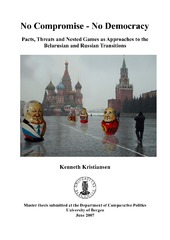No Compromise - No Democracy. Pacts, Threats and Nested Games as Approaches to the Belarusian and Russian Transitions
Master thesis
Permanent lenke
https://hdl.handle.net/1956/2663Utgivelsesdato
2007Metadata
Vis full innførselSamlinger
Sammendrag
Belarus and Russia entered simultaneous transitions as the Soviet Union broke down at theend of 1991. As most other former Soviet republics Belarus and Russia did not end up withdemocratic regimes as a result of transition. However, the Russian regime can be regarded farmore liberal in character than the Belarusian. The main question to be answered is why onecan observe this difference in regime type in two otherwise similar countries. This question isaddressed by applying actor-oriented transition theory and game theory to analyse theinteraction about regime type during transition.I conclude, by focusing on actors, that the main explanatory factors for this observeddifference can be found in the variation in the games of social interaction about the issue ofconstitution occurring during transition. Belarus experienced a lower pressure for changeamongst elites and the population than Russia. Furthermore, Belarusian elites hindered theimpact of the phase of liberalisation, leaving the country worse prepared for transition thanRussia. Due to various reasons no compromise which could have secured democracy or aliberal regime was reached in either of the countries. This left them with sub-optimal conflictsoutcomes as a result of transition.None of the countries managed to escape the sub-optimality of the transition throughcooperation or pacts. In Belarus an inconclusive compromise about national independencehindered cooperation about regime type resulting in a situation of nested games. In Russia acompromise was hindered by disagreement about the threatening power of the ruling fractionduring transition leaving the actors in a situation of sub-optimality.
Utgiver
The University of BergenOpphavsrett
The authorCopyright the author. All rights reserved
